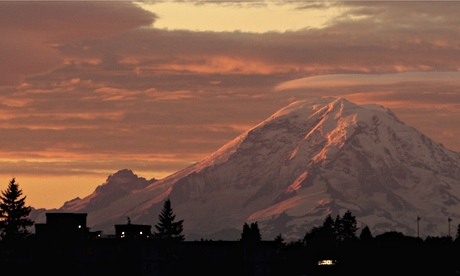
Fifty years ago this October three American poets, Allen Ginsberg, Gary Snyder and Philip Whalen, met at the bottom of Mount Tamalpais, a small mountain at the northwest end of San Francisco bay, to perform a ritual of their own devising. Following the example of Tibetan Buddhist monks, they walked clockwise around the mountain, imitating the path of the sun as a kind of meditation. Nowadays, the 15-mile circumambulation of Tamalpais is celebrated four times a year, but minus the poets.
This may seem like a typical bit of Californian hippie-dippy nonsense, but the association of poetry and mountains dates back at least as far as the classical myth of the Muses and their link with Mount Olympus. The Beat poets’ interest in mountains was not purely spiritual, either. Many of them spent their summers working as fire lookouts in the western ranges, a handy way to earn a bit of money and make time for thinking and writing. Both Whalen and Snyder wrote poems about their experiences on Sourdough Mountain, one of the most gruelling climbs in Washington State.
Of course, the Beats weren’t the first generation of American poets to write about mountains. Robert Frost’s poem called, simply, The Mountain is set in Canada but plays with the association of mountain, Muses and a spring and in the final lines the simple cattle drover morphs into an ancient god. Kenneth Rexroth, two decades later, took to the mountains to have space and distance to be able to write about the political situation in Depression America, and specifically the deaths of Sacco and Vanzetti. The indestructability of Milestone Mountain stands for the endurance of the ideals he believed the dead men embodied.
The mountains of these islands may lack the scale of their American counterparts, but they have their own grandeur and have inspired their own poetry. When we think of the Romantics as poets of the Lake District we can easily forget that the area is as noted for its peaks as its water and that in many respects the former were more significant for the poets than the latter. In The Eolian Harp, Coleridge escapes the confines of an enclosed garden and climbs a mountain to discover his pantheistic vision of the oneness of things. Equally, in Wordsworth’s Lines Composed a Few Miles above Tintern Abbey it is the mountain landscape around the abbey as much as the building itself that works on his memory and impresses thoughts of seclusion on his mind.
In the 1930s, Cecil Day-Lewis envisaged his Magnetic Mountain as a kind of land of milk and honey to stand in contrast to the realities of Depression Britain. If Day-Lewis saw mountains as being something of a paradise, for Ezra Pound, they represented the antechamber of hell, at least in his Canto XVI.
In An Octopus, Marianne Moore uses various animal metaphors for the glacier on top of Mount Rainier, which, like the Beats, she once hiked around. This might seem somewhat arbitrary at first, but Moore is concerned with the idea of the mountain as a complete ecosystem, and the choice of metaphor acts as a kind of ground against which the actual flora and fauna of the mountain are picked out. The poem is a kind of hymn to Moore’s “capacity for fact”.
Fine as all of these poems are, the ultimate mountain verse has to be Wallace Stevens’s The Poem that Took the Place of a Mountain. In a typically playful mood, Stevens writes a poem that, if anything, is more real than the mountain it replaces, with the capacity, unlike the actual mountain, to become the reader’s “unique and solitary home”.
And so, this month’s Poster poems challenge is to write verses celebrating mountains, in all their many and various forms and moods. Whether you’re a climber or someone who prefers admiring them from afar, mountains are hard to avoid and offer a wide range of possibilities for writing poems. Please share yours here.

